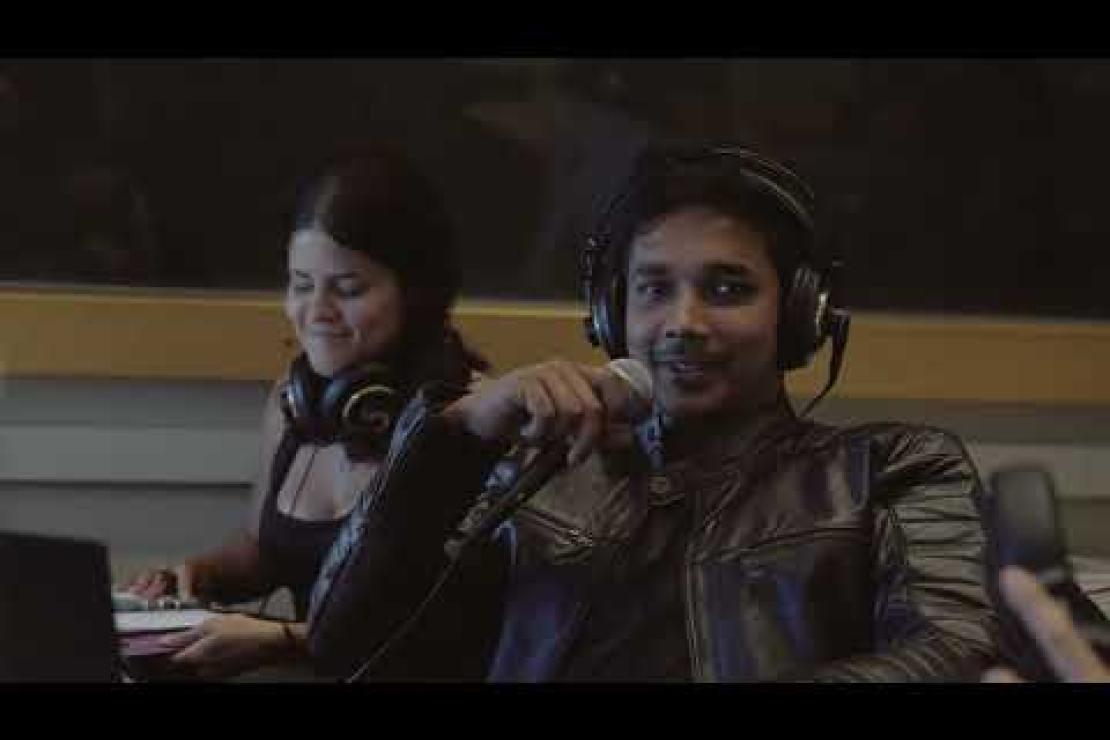Cinema & TV Department
It Starts With A Story: Yours
At Los Angeles City College, the Cinema & Television Department isn’t just a place to study film, it’s where the next generation of storytellers begin.
Rooted in the heart of Los Angeles, our campus reflects the city we serve: bold, diverse, and full of possibility. We believe a career in film and television shouldn’t be reserved for the few who can afford private tuition or elite programs. That’s why we offer real, hands-on training—on sound stages, in edit bays, and behind cameras used by professionals—at a cost that keeps the dream within reach.
With tuition as low as $46 per unit, you don’t have to choose between passion and practicality. All you need is a place to begin. You just found it.
Your Journey to Hollywood Starts Here
From Academy Award-nominated editors to emerging TV writers, our students are building real-world careers in film and television—and it all started here at Los Angeles City College.
▶️ Watch the video and hear directly from students and alumni who turned their dreams into reality—with affordable, industry-grade training, right in the heart of Hollywood.
Every Filmmaker Starts Somewhere — Start Here
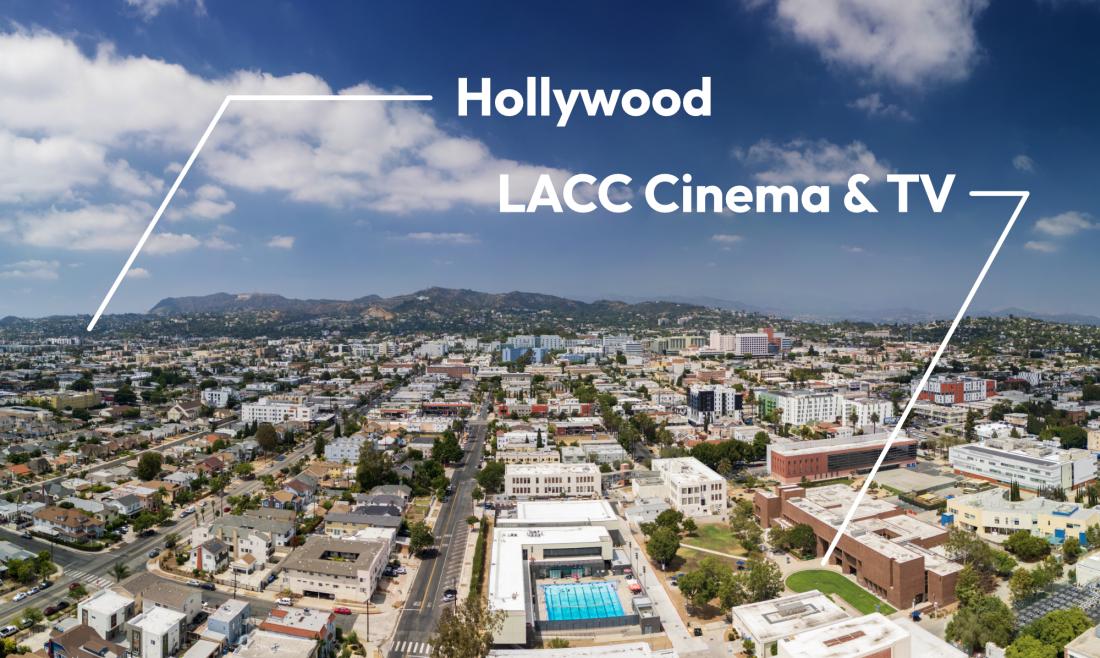
Hands-on Training in the Heart of Hollywood
The first time you step into a sound stage. The first time you watch your own film on the big screen. The first time you realize—you belong here.
At the LACC Cinema & Television Department, we don’t just talk about filmmaking—we live it. Our students work with the same gear, in the same kinds of studios, and on the same kinds of challenges you’ll find in the industry. We believe that hands-on experience isn’t a luxury—it’s the foundation of everything we do. And it all happens right under the Hollywood sign.
Dream It. Shoot It. Edit It. Here.
You don’t have to wait to be a filmmaker. At LACC, you’ll train on the same equipment and in the same environments used by industry pros—because your work deserves the real thing. You start right away creating film and TV.
A Theater That Honors the Artform
You’ll study the masters the way they were meant to be seen. The Morgan Freeman Theater is a 108-seat cinema equipped with professional projection systems for 35mm, 16mm, and DCP formats. Whether you’re watching a restored print or presenting your own work, this space makes film feel sacred.
Studio C — The Cinematography Stage
This is where you’ll learn to tell visual stories with intention. Studio C is our dedicated cinematography sound stage, outfitted with Arri and Panavision cameras, a full suite of grip and electric equipment, and a JL Fisher dolly, generously provided each semester. Students get hands-on experience lighting, building, and executing cinematic shots—skills that carry straight into professional sets.
Studio A — Live TV, Real-Time Learning
Fast-paced, high-pressure, and fully immersive—Studio A is where students dive into the world of live television production. With a detached control room housing professional switchers and monitoring gear, this space trains students to think on their feet and work as a team, just like in a real control booth.
Crafting Emotion in the Color Suite
Our color grading lab gives students access to DaVinci Resolve, Blackmagic Design Micro Color Panels, and color-accurate monitors—everything needed to fine-tune the look and feel of a film. Here, you’ll learn that color isn’t just technical—it’s storytelling.
Post-Production Sound & Podcast Suites
Great films don’t just look good—they sound incredible. Our three sound-isolated suites serve dual purposes: podcast production and post-production sound editing. Each one features tuned monitors, acoustic treatment, and the tools you need to sculpt dialogue, mix soundscapes, and bring your stories to life through sound.
Mac Studio Lab — Where Projects Come to Life
With nearly 40 Apple Mac Studio M2 Max workstations, our digital lab is the heartbeat of editing, screenwriting, and post-production classes. Whether you're collaborating with classmates or putting the finishing touches on your final cut, this lab is where student projects take shape.
Find Your Focus, Master Your Craft
You know you want to work in film or television—but what part of the process lights you up? Here’s your chance to explore, experiment, and go all-in on the path that speaks to you most.
You see the story before it’s even shot—that’s the director’s gift.
In our Directing courses, you’ll learn how to shape a story from the page to the screen. Through hands-on training in single-camera production, you’ll develop core skills in blocking, shot design, rehearsing actors, and visual storytelling. From casting to performance to post, you’ll step into the role of a true creative leader.
Whether you're just starting out or ready to deepen your craft, our beginning and advanced directing courses are led by working professionals—including instructors with feature films under their belt. You won’t just learn how to direct—you’ll learn how to lead.
This is where the story really takes shape.
In post-production, every cut is a decision—and every decision shapes the story. Our Editing courses give you the skills to build powerful narratives through picture, sound, and rhythm. You'll work hands-on with Adobe Premiere Pro and Avid Media Composer, learning the techniques professionals use every day in film and television.
Students also have the opportunity to earn Avid Media Composer Certification, giving you an industry-recognized credential that sets your résumé apart.
Love bringing stories to life—from the first idea to final release? That’s producing.
Producers are the glue that hold a project together. At LACC, you'll explore the many roles producers play—creative, logistical, and everything in between. You’ll learn how to find and shape compelling stories, manage budgets and schedules, lead a team, and navigate the business side of film, television, and emerging media.
Whether you're developing a short film or prepping a pitch for a series, you’ll gain the skills to take a project from concept to completion—and make it real.

Every great film starts the same way—with a blank page and a bold idea.
In our screenwriting classes, you'll learn how to bring those ideas to life—whether it's a feature film, short, or television series. From story structure to character arcs to writing that first unforgettable line of dialogue, you’ll be guided through the entire creative process: breaking your story, building your outline, and finally, putting words to the page—starting with FADE IN and ending with FADE OUT.
Our faculty are working professionals who know what it takes to write for the screen—and they’re here to help you find your voice, hone your craft, and write the kinds of stories only you can tell.
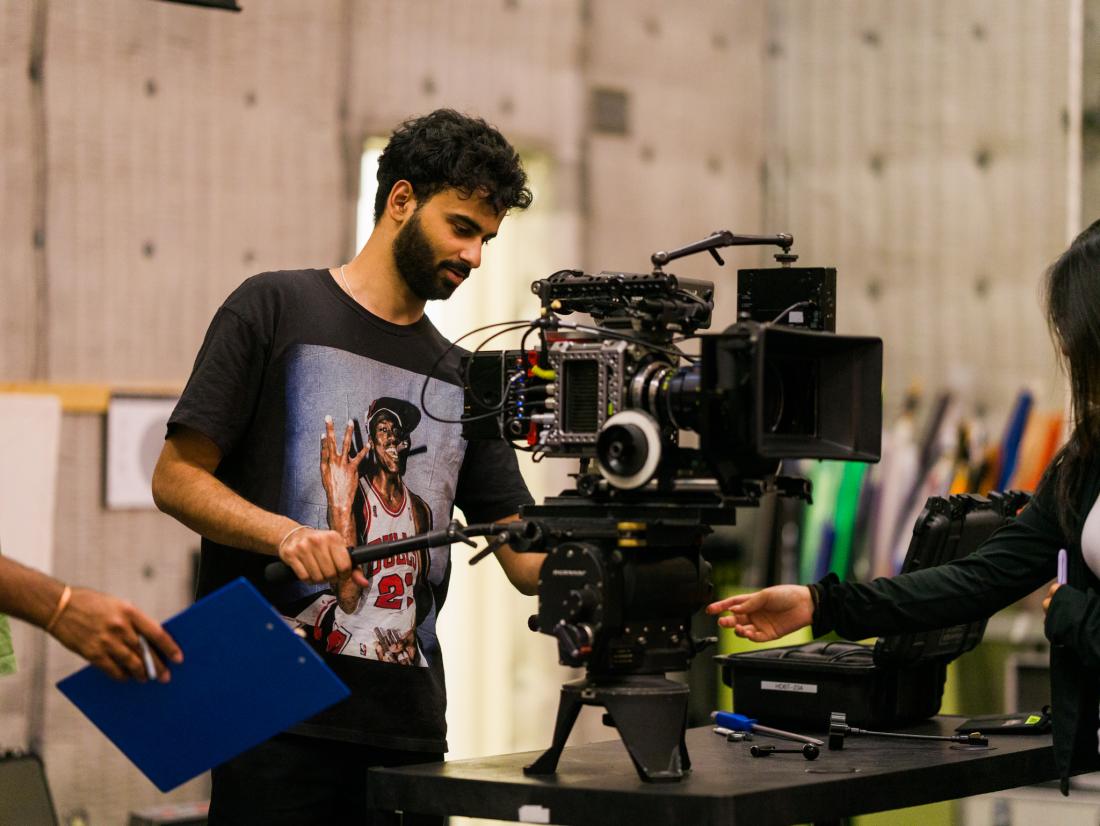
Lighting the shot. Framing the story. Capturing the emotion.
In our Cinematography courses, you won’t just study camera techniques—you’ll practice them on real sets with professional gear. From learning how to operate Arri and Panavision cameras to managing data workflows and collaborating with directors, you’ll gain the technical and creative skills to bring a visual story to life.
Whether you're aiming to become a cinematographer, camera assistant, or digital imaging technician, you'll learn the craft from the ground up—including hands-on experience with color grading and post-production tools.
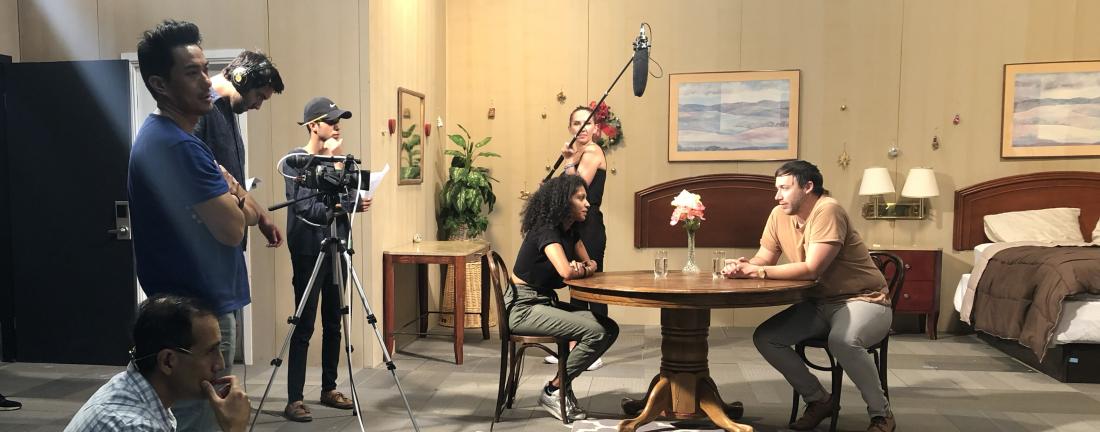
Sound isn’t just background—it’s emotion, tension, and atmosphere. It’s half the story.
In our Sound for Film courses, you’ll explore how audio shapes everything from tone to pacing to emotional impact. You’ll train in dialogue editing, ADR, foley, mixing, and sound design—learning how to sculpt sound that supports and elevates the moving image.
Students receive hands-on experience in three professional-grade post-production sound suites, featuring acoustically treated rooms, calibrated studio monitors, and the same tools used in the industry every day.
You'll learn on Avid Pro Tools, the gold standard in post-production audio—and have the opportunity to earn Pro Tools industry certification, giving you a professional edge before you even graduate.
Whether you want to work as a sound designer, re-recording mixer, ADR engineer, or foley artist, you’ll graduate ready to make noise in the best way possible.
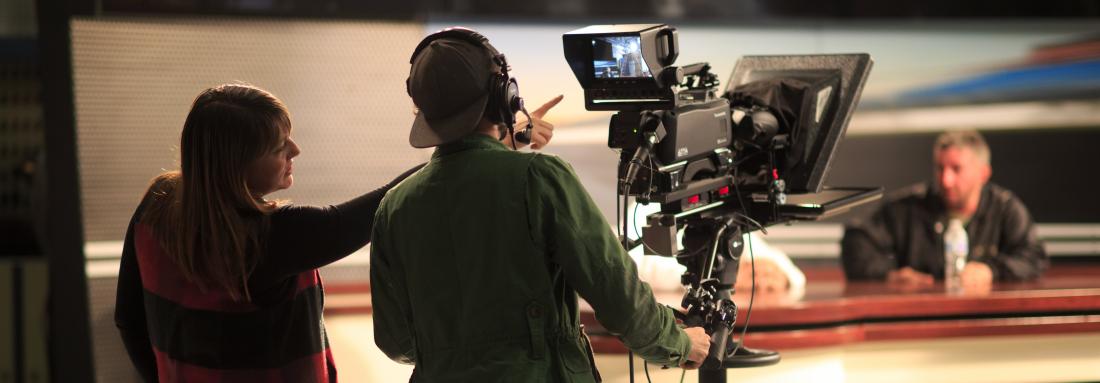
Lights up. Cameras rolling. Headsets on. This is where collaboration meets control.
In our Television Production program, students step into the fast-paced world of multi-camera studio production—learning how to plan, shoot, and deliver scripted and unscripted content with the precision of a live set.
You’ll work in Studio A, our largest sound stage, designed specifically for live TV production. With a detached control room, industry-standard broadcast switchers, and a professional-grade setup, you’ll gain real experience in every phase of production—from pre-visualization and planning to switching and directing in real time.
Whether your goal is to direct a sitcom, operate a camera on a live show, or shape the look and feel in post-production, this program prepares you for it all. Students explore roles in producing, writing, directing, camera operating, lighting, grip & electric, editing, color correction, and sound engineering—with a strong foundation to work in scripted series, reality TV, or live broadcast.
And with a curriculum grounded in hands-on learning, collaboration, and creative leadership, you won’t just study television. You’ll make it.
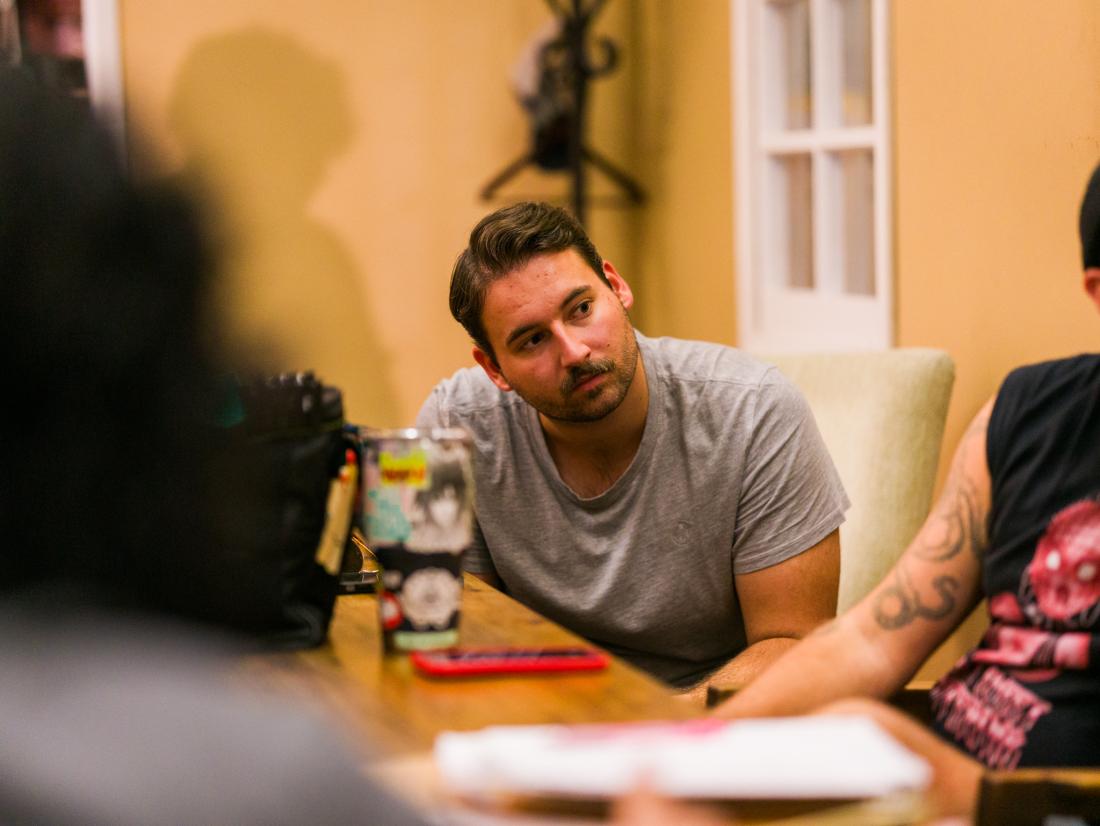
Before you specialize, you’ll build a foundation in the language, history, and tools of filmmaking. These courses introduce you to production, critical analysis, and cinematic storytelling—so no matter which path you follow, you’ll be ready to create with confidence and intention.
CINEMA 001 – Introduction to Motion Picture Production
Your first deep dive into how movies are made. Learn the essential tools of the trade—cameras, lenses, lighting, audio, and pre-production planning—through hands-on instruction. This course is all about understanding the gear and the process behind the scenes. For full hands-on shooting experience, pair this with Cinema 002.
CINEMA 002 – Beginning Motion Picture Workshop
Time to tell your story. In this hands-on workshop, you'll direct and shoot your own short films while learning composition, sound, lighting, and editing. You’ll take your ideas from concept to post-production using professional-grade digital video tools. Concurrent enrollment in Cinema 001 is recommended for full production experience.
CINEMA 003 – History of Motion Pictures
Before you can shape the future, you have to understand the past. Explore how cinema evolved—from its early beginnings to today’s blockbusters—with a focus on American feature films. Learn how history, culture, and innovation shaped the movies we love.
CINEMA 004 – History of the Documentary Film
Examine the art of telling the truth on screen. From propaganda to participatory film, this course explores how documentary filmmakers reflect, challenge, and shape the world around them. Learn to view non-fiction films with a critical eye—and understand the power of perspective.
CINEMA 018 – Introduction to Film Genres
Why do some films thrill, others move us to tears, and some make us laugh out loud? Discover how genre shapes audience expectations, storytelling styles, and the evolution of film history. Screen and analyze iconic films from major genres and understand the forces that drive what we see on screen.
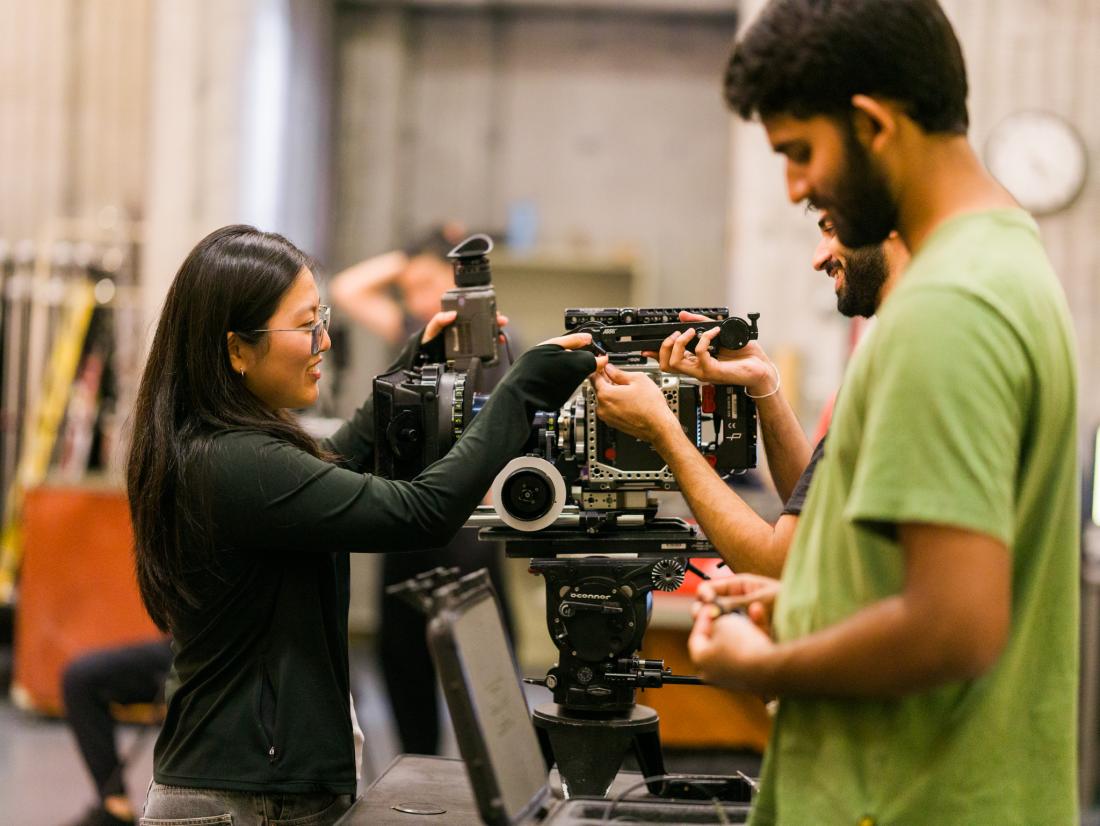
This degree is built for students who want to take their passion further—whether that means transferring to a CSU film program or stepping into the entertainment industry with hands-on experience already under their belt.
The Associate in Science for Transfer in Film, Television, and Electronic Media combines foundational theory with real-world practice. You’ll study film and television history, explore storytelling across genres and formats, and gain technical skills through production-focused courses in writing, directing, editing, and more.
Whether you plan to continue your education at a four-year university or pursue creative work right away, this program gives you the academic groundwork, the portfolio, and the confidence to move forward.
